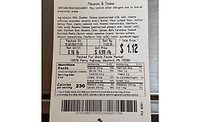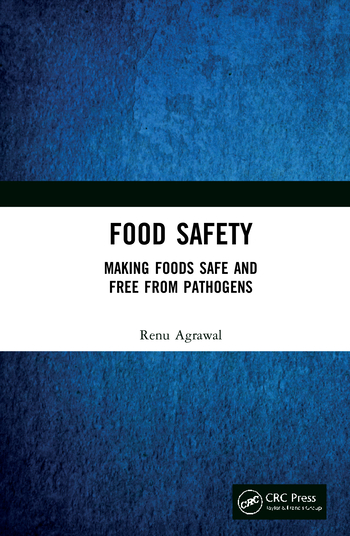Egg-cellent Food Safety Strategies at Primera Foods

Primera Foods is a veteran in the war against Salmonella. The ingredient manufacturing company based in Cameron, WI, was founded in 1986 as a specialty dried eggs products manufacturer, and even though its portfolio of products now range from specialty gums and starches to fudge and caramel concentrates, the mainstay of its business is still in eggs. Primera Foods delivers dozens of spray dried, organic, frozen and liquid egg products to customers in baking, pasta, ice cream, convenience foods, confections and nutritional foods industries. Today, Primera Foods has more than 170 employees at its four facilities in Wisconsin, Illinois and Minnesota.
Primera Foods’ success, says Tom Brown, director of operations, comes from its dedication to quality and commitment to the needs of customers. “These are not just bulk cases of egg whites,” he says. Along with standard whole eggs, yolks and albumen, Primera Foods’ extensive list includes free flow eggs and yolks, frozen sugared and salted yolks and whites, instantized and high whip albumen, and a variety of organic egg products.
Primera’s team puts great effort into all of its egg formulas, studying the taste, texture and durability of each product to get the best results. “We view egg products as functional ingredients,” Brown says. “We work with customers who might need something a little different. We find ways to make our products work in their recipes.” Primera Foods often works directly with clients on their recipes, sometimes tweaking their own egg products to help the client solve a production or process problem.
Along with making sure the eggs look and taste great, Primera Foods invests considerable resources in its Good Manufacturing Practices (GMP), food safety, Hazard Analysis and Critical Control Points (HACCP) and allergen programs to ensure that no contaminated product ever gets shipped.
The War on Salmonella
When you mention “eggs” and “food safety” in the same sentence, even people who have never heard of a HACCP program immediately think of Salmonella. Because shell eggs have a high risk of carrying and spreading Salmonella bacteria—the cause of one of the most common intestinal infections in the U.S.—it’s a major health concern for most consumers. It’s also a stereotype that Primera Foods would like to overcome, says Kristin Zuzek, director of quality assurance. “It’s an ongoing challenge for us to decrease the negative stereotype regarding Salmonella in egg products by providing safe and wholesome products to our customers.”
More than 40,000 cases of salmonellosis are reported yearly and approximately 600 of those people die annually but none of those contaminations have ever come from a Primera Foods product. Primera Foods has never had an occurrence in which a product that was not safe has entered the market because Primera’s Quality Assurance (QA) team goes above and beyond established requirements for food safety when it comes to handling eggs. Primera Foods has actually won new customers who had problems with Salmonella when working with other manufacturers. “We have a very high customer retention rate and a certain amount of that customer loyalty is due to our quality and food safety,” Brown says.
Plant Managers Are First Line of Defense
“Egg processing is under U.S. Department of Agriculture (USDA) inspection, however, USDA does not currently regulate egg HACCP,” Zuzek says. But that doesn’t stop Primera from striving to institute and apply higher standards of food safety and sanitation for egg processing. “One of our challenges is to break the perception that we meet only USDA requirements,” she says. “Our goal is to not only meet any USDA requirements but to continue to meet, evaluate and raise internal standards for food safety and quality.”
Primera’s QA team considers USDA solely as an auditor and has established its own set of food safety and HACCP programs for the egg products it produces. “The USDA requirements are the minimum of what you need to do to get by,” Brown adds. “We want to get to another level of safety, for ourselves and our customers.”
The QA team is a corporate entity only at Primera Foods. Its seven members include Zuzek, degreed technical QA food technologists and a laboratory assistant. The QA team oversees the quality and food safety programs at all of Primera’s six facilities, but the plant managers take responsibility for daily quality checks, HACCP checks and other quality control issues. “It allows the operators to take ownership of the process, which is an important part of our food safety program,” Zuzek says of Primera’s decision to put plant managers in charge of daily quality control issues. “It’s not just a QC person’s concern, it’s everyone’s responsibility.”
Plant managers are also directly involved in all of the third-party audits, and conduct cross functional in-house audits on their own teams as part of Primera’s Quality Improvement program. These include surprise GMP audits, food security, HACCP and mock recall audits. “Employees know that at any time they could be audited,” says Tim Wacker, plant manager of the Perham, MN, facility.
The surprise audits ensure employees follow the food safety programs all the time. They don’t see audits as an event to prepare for but rather an ongoing part of the process. “There’s an added expectation to maintain the highest level of quality all the time,” Wacker says, “because if you don’t follow your programs every day it’s meaningless.”
Each manager goes through extensive training to ensure they are up to this challenge. The courses include training on HACCP, allergens, OSHA, and quality auditor skills, along with one-on-one training on the specific quality programs for their facilities.
The QA team frequently travels to the facilities to review the food safety efforts and verify that the programs continue to be effective. Team members work directly with plant managers, helping them evaluate their programs and addressing the need for changes or improvements. That includes regular hazard analyses to understand exactly the true critical control points at each facility versus the quality control points, Zuzek says. For example, the food safety system, sifter and metal detector are considered critical control points, whereas temperature on egg storage tanks and moisture testing are quality control. While all of the checks are important, making this differentiation reinforces the critical nature of food safety issues, Zuzek notes. “It helps employees understand the potentially deadly consequences of deviating from the food safety program.”
The QA team also holds weekly meetings with plant managers to support their safety efforts, discuss problems and review the week’s production process as part of the company’s Positive Release program, which prohibits any product from being shipped without a complete quality inspection. Through this program, no product is released until a review of the production process has been made, production paperwork including HACCP items are verified, and testing of all finished product is completed. All product lots are tested for Salmonella and samples are taken daily and sent to the USDA Food Safety and Inspection Service (FSIS) Pasteurized Egg Products Recognized Laboratory at the Cameron facility.
The paperwork to verify that HACCP and sanitation programs have been adhered to is reviewed daily, first by lead operators as they do quality, critical control points and HACCP checks, then by plant managers to verify every step in the process was completed and properly recorded. The paperwork is also reviewed at the weekly meetings by the QA team with the plant managers. “Our whole view of our HACCP program is that if it’s not documented, it wasn’t done,” Zuzek says.
If any incidents or events have occurred that might have affected food safety, such as a power outage or a drying temperature malfunction, the product lot is isolated and all aspects of the event are investigated before the product is released. The occurrence also is discussed in detail at the meeting as a way to improve processes and avoid problems in the future. “It’s a backup system,” Brown says. “The plant managers share their information so we don’t have to make the same mistakes at every location.” The managers then discuss the outcomes of those meetings with the rest of the employees and share corporate feedback ensuring that everyone involved with food safety is in the communication loop.
Controlled Air Flow is the Weapon of Choice
Food safety isn’t just an issue inside the plants, adds Brown. Primera Foods’ egg sanitation program begins with the hens. Egg vendors are audited through Primera’s approved supplier program. Farms are audited on-site and liquid suppliers complete HACCP and sanitation paperwork detailing and verifying their food safety processes. Primera has roughly two dozen whole egg suppliers and six to 10 liquid egg suppliers, many of whom have sold product to the company for years, so Primera has a track record confirming its standards of excellence, Brown adds. “This system gives us a certain level of comfort that our raw product is of the highest quality.”
Once the whole eggs enter the facility they are sent through a chlorine shower to clean and sanitize the shell. “Generally, the egg is sterile until it’s broken,” notes Tim Hite, plant manager for the Cameron, WI, facility. “Our goal is to get the outside of the egg as clean as possible before we break it.”
The sanitized whole eggs then pass through a wall of positive filtered air where the breaking occurs, ensuring that the raw egg isn’t exposed to any bacteria that may be present in the air surrounding whole unclean eggs. From there the eggs are pasteurized at 142F to 148F for three-and-a-half-minutes to kill any remaining bacteria, then sent to a higher level of the plant where the liquid is stored in tanks under 40F to inhibit bacteria growth.
Each Primera Foods facility is designed to direct air away from the pasteurized egg production areas toward the raw egg production areas to ensure that airborne bacteria is funneled away from the most sensitive product points. Air flow and traffic patterns are especially critical when dealing with the dried egg whites, which are spray dried before they are pasteurized. Primera Foods spray dries them first because it affects the functionality of the end product, Brown says, but it also means that the unpasteurized powder could be easily be tracked through the plant on employees’ clothing or shoes. Even though the egg whites are placed in plastic lined boxes directly after the drying process, and opened only for testing before pasteurization, the airflow in those rooms is filtered and directed away from other products. To further reduce risk, employees who work in multiple areas of the building, such as the maintenance crew or project managers, don protective clothing when they enter the spray dry rooms.
Focus on Allergen Control
Primera Foods’ Cameron, WI, facility faces additional food safety challenges because it produces both egg and non-egg products simultaneously, which requires an extravagant allergen maintenance program to prevent cross-contamination. Because the plant was built 75 years ago, isolating the egg production areas was tricky, Hite notes. But running both kinds of products in a single building allows Primera Foods to stay in production around the clock, maximizing its investment.
To ensure the non-egg products are at no risk of being contaminated, Primera Foods installed an airlock between the two sides of the Cameron plant, creating a room of negative air that no product ever crosses through. “The airlock prevents the possibility of air contamination,” Hite says.
To further guarantee safety, the workers who handle egg products are completely separated from those who handle non-egg products. “Employees who work with the eggs have separate locker rooms, breakrooms and bathrooms so their paths never cross,” Hite says.
Every employee goes through an allergen training program during new hire orientation to guarantee that they understand how important it is to keep the two areas separate, and what can happen if someone who is allergic to eggs eats a product that has been labeled as non-allergen containing. “This is a very serious issue for us,” Hite says. “We’ve terminated people who have broken this rule.”
This training is an important part of making the food safety program successful, Zuzek says. “We don’t just teach employees how to do something, we teach them why it’s important. It helps them see the impact of what they do.”
The plant managers at each of the four Primera Foods production facilities conduct most of the employee training. They have a regular training matrix with 22 to 26 target areas, depending on the production cycle, but they determine what the ongoing learning needs are for their teams, holding training events when they determine it is necessary. “They are in the plant daily so they know better than anyone what needs to happen and where the gaps are,” Zuzek says.
A New Goal on the Horizon
This total involvement by plant managers and employees in food safety has helped Primera Foods achieve stellar food safety standards across the company and to continue to raise the bar on its own expectations. “We consider GMP and food safety audits as the minimal standard for ourselves,” Zuzek says.
The company’s latest goal is to be one of the first egg processors to win certification when the USDA implements regulatory HACCP for eggs. “We are looking into the future,” Zuzek says. “We’ve already got the preliminary programs in place, so that when the USDA is ready we will be too.”
Sarah Fister Gale is Associate Editor of Food Safety Magazine. Prior to joining the editorial staff of FSM and its sister publication, Organic Processing Magazine, Gale freelanced for several well-known publications such as Inc. Magazine, and assisted companies in the development of feature articles, annual reports, training manuals and books.
Looking for a reprint of this article?
From high-res PDFs to custom plaques, order your copy today!









